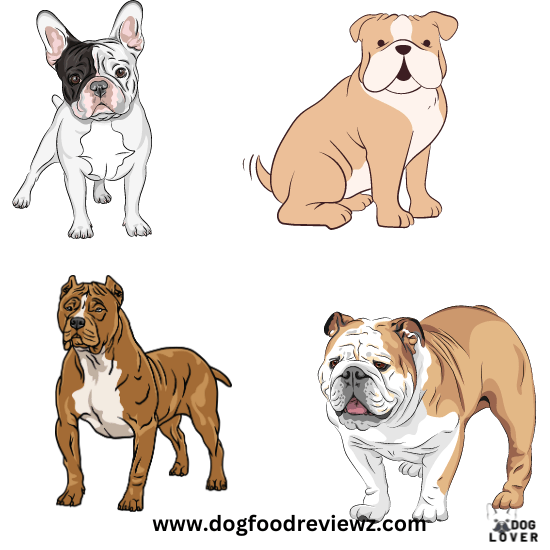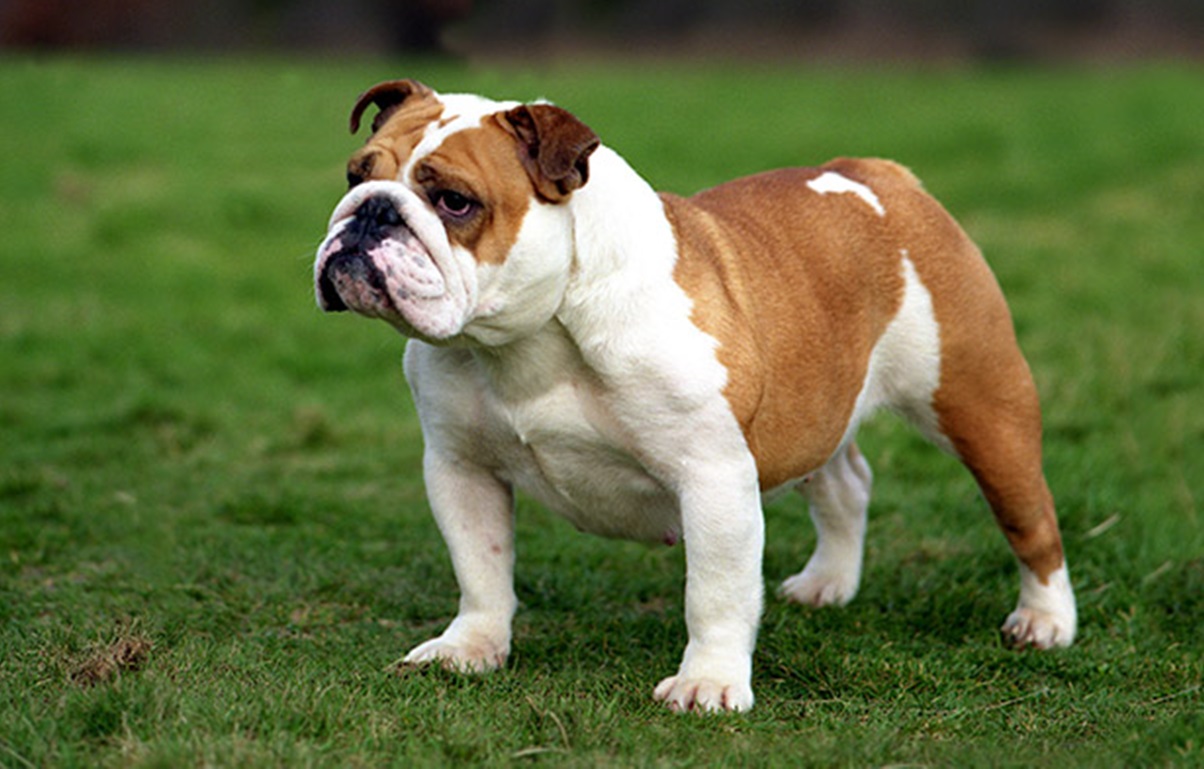Do you fancy bringing home Bulldogs as your dream pet?
The good news is that you can never run out of choice, as these dogs come in numerous types.
Come with us as we explore some of the most common types of bulldogs available.

About Bulldogs
Bulldogs are undeniably some of the most adorable dog breeds in the world. With their wrinkly faces, large heads, stumpy legs, undershot jaws, and sweet expressions, these pups are sure to steal your heart.
Generally, Bulldogs are known for their stocky, muscular build, laid-back, and gentle disposition. These dogs were initially bred for a bloody sport called bull-baiting but have since evolved to become among the most loved furry companions.
What is special about bulldogs?
Besides their unique appearance, bulldogs are renowned for their sweet, affectionate, and gentle disposition. These people-oriented dogs thrive on human attention and have a particular fondness for children. Bulldogs are highly kind but courageous, friendly but dignified.
Types of Bulldogs
There are various bulldogs, each with unique traits and charm. These are some of the types of bulldogs available:
- French Bulldog
- Olde English Bulldogge
- American Bulldog
- Australian Bulldog
- English Bulldog
- Bullmastiff
- Catahoula Bulldog
- Serrano Bulldog
- Brazilian Bulldog (Campeiro Bulldog)
- Victorian Bulldog
- Valley Bulldog
- Mammut Bulldog
- Bullenbeisser (German Bulldog)
- Continental Bulldog
- Mallorquin Bulldog (Ca de Bou)
- Spanish Bulldog
- Alapaha Blue Blood Bulldog
4 Popular Bulldogs Breeds for Families
Which type of bulldog do you know?
These are 4 of the most popular bulldog breeds best suited for families.
French Bulldog

Fondly referred to as a Frenchie, the French Bulldog is a small and sturdy dog with a compact build. Did you know that the Frenchie originated from England, not France, as its name suggests? Well, now you know. The current Frenchie that we know today resulted from crossbreeding toy English Bulldogs with Parisian ratter dogs giving it its distinctive bat-like ears.
Frenchies are renowned for their affectionate and laid-back disposition. These dogs also make excellent companions thanks to their playful, friendly, and eager-to-please nature.
Breed Fast Facts
| Breed | French Bulldog |
| Origin | England |
| Height | 11-13 inches |
| Weight | 16-28 pounds |
| Temperament | Playful, fun, affectionate, adaptable, stubborn, and smart |
| Exercise needs | Low |
| Coat type | Short and smooth |
| Coat color | Various, including white, fawn, brindle, cream, and pied |
| Lifespan | 10-14 years |
Pros
- Frenchies are highly affectionate and loving dogs making them great family pets.
- They make excellent companions.
- They are gentle and playful hence great with kids.
- Frenchies make good apartment dogs.
- They have low exercise needs.
- They are easy to groom
Cons
- They are needy and prone to separation anxiety.
- Frenchies are susceptible to various health issues.
- They are some of the most expensive dog breeds available.
- They snore and fart a lot.
Who should own one?
Frenchies are great for:
- Families with children as they are gentle and playful
- Apartment dwellers as they are not known to bark a lot.
- First-time dog owners because of their low upkeep requirements.
- Busy individuals because of their low exercise needs.
American Bulldog

The American Bulldog is a direct descendant of the English Bulldog but bigger and stronger. This dog breed is known for its strength, agility, and endurance. American Bulldogs were brought to the United States in the 18th century when immigrants came with them to South America.
The American Bulldog has a sturdy and muscular body with an athletic build. It weighs between 60-120 pounds. It has a large head with strong jaws, a broad chest, wide shoulders, and a square body.
Breed Fast Facts
| Breed | American Bulldog |
| Origin | England |
| Height | 20-25 inches |
| Weight | 60-120 pounds |
| Temperament | Confident, loyal, protective, and friendly |
| Exercise needs | High |
| Coat type | Short |
| Coat color | Black, white, fawn, brown, red, and brindle |
| Lifespan | 10-16 years |
Pros
- They are protective, loyal, and devoted to their families.
- They are highly intelligent and easy to train
- American Bulldogs are highly versatile and adaptable.
- They are good with children
- They make good guard dogs
Cons
- They have a strong prey drive
- They can be aggressive towards other dogs and unfamiliar people
- They are highly energetic and require lots of exercise.
- They are stubborn
Who should own one?
American Bulldogs are best suited for active individuals who have time and energy to meet their high exercise needs. They also do well in single-pet households as they can be aggressive to other pets.
English Bulldog

Simply referred to as a bulldog, the English Bulldog is a medium-sized dog with a stocky and muscular build, square wrinkled face, short muzzles, wide shoulders, and short limbs. This bulldog breed was initially used for bullbaiting. However, after the sport was banned, the English bulldog was bred as a gentle, calm dog fit for companionship.
English Bulldogs are known for their people-pleasing nature and incredible craving for human attention. They are also sweet and friendly, among the most popular family pets.
Breed Fast Facts
| Breed | American Bulldog |
| Height | 14-15 inches |
| Weight | 40-50 pounds |
| Temperament | Friendly, docile, calm, and courageous |
| Exercise needs | Moderate |
| Coat type | Short and smooth |
| Coat color | White, fawn, brown, or red. |
| Lifespan | 8-10 years |
Pros
- English Bulldogs are people-oriented.
- They are quiet dogs that don’t bark much.
- They don’t require much space, making them excellent apartment dogs.
- They are low-maintenance dogs in terms of grooming and exercise needs.
Cons
- English Bulldogs have a stubborn streak
- They are prone to various health issues.
- They have breathing problems.
- They are a pricey breed.
Who should own one?
Due to their affectionate, gentle, and calm nature, English Bulldogs are best suited for families with children.
Olde English Bulldogge

Originally bred in 1970, the Olde English Bulldog was created to match the looks of the bull-baiting English Bulldog of the 1800s. This breed was created by crossing the English Bulldog with the American Bulldog, American Pitbull Terrier, and Bullmastiff.
The Olde English Bulldog was selectively bred to eliminate the breathing and breeding problems of the English Bulldog. The result was a muscular, powerful, medium-sized dog with a large head, thick, wide neck, square muzzle with large nostrils, and an undershot bite.
Breed Fast Facts
| Breed | American Bulldog |
| Height | 16-19 inches |
| Weight | 50-80 pounds |
| Temperament | Brave, confident, friendly, calm, and courageous |
| Exercise needs | Moderate |
| Coat type | Short and smooth |
| Coat color | White, fawn, brown, black, brindle, or red. |
| Lifespan | 10-14 years |
Pros
- It makes a good family dog due to its friendly and social nature
- It’s highly adaptable
- Olde English Bulldogs are low-maintenance dogs.
Cons
- They can be too over-protective
- They eat lots of food
Who should own one?
The Olde English Bulldog is ideal for singles, seniors, and families with children and other pets. It also fits well in an apartment or home with or without a yard.
Things to Consider Before Owning a Bulldog
These are some of the things you should consider before owning a bulldog:
- Bulldogs can be very stubborn: While incredibly intelligent, they can also be stubborn and strong-willed, making training them challenging. They thus need a firm and consistent trainer. Positive reinforcement training techniques work best for these dogs.
- Bulldogs are high-maintenance in terms of health: Due to their peculiar facial and body structures, bulldogs are susceptible to several health issues. Thus, they are quite demanding in terms of medical care.
- They snore loudly: Because of their flat faces, bulldogs are brachycephalic dog breeds. This makes them prone to respiratory issues and lots of snoring.
- They require near-constant human attention: Bulldogs are extremely social dogs. These dogs will follow you everywhere and constantly seek your attention. While this is good, it also makes them prone to separation anxiety if left alone for long periods.
- Bulldogs don’t need too much physical exercise: Although they still need some physical activity, bulldogs don’t need too much exercise. This is due to their facial structure, which makes them prone to breathing problems when over-exerted.
- They can’t tolerate hot temperatures: Bulldogs cannot regulate their body temperatures. Exposing these dogs to extremely hot weather makes them prone to overheating. It’s thus important to ensure that they remain cool by providing shade and scheduling their exercise when it’s cooler. Also, ensure you provide lots of water to keep them cool.
- They are susceptible to food allergies: Bulldog breeds have particularly sensitive stomachs, making them prone to food allergies. Be watchful of the type of food that you give to your dog to avoid this issue.
Why you shouldn’t get a Bulldog
While there is so much to love in Bulldogs, these dogs don’t come without their share of disadvantages. These are some of the issues that make bulldogs undesirable:
- They are prone to various health issues: Bulldogs are brachycephalic breeds. This means they have a flat-facial facial structure with constrained nostrils and nasal airways, making them prone to breathing issues.
- Bulldogs are stubborn: Bulldogs are strong-minded breeds that love to have their way. This makes training these dogs very difficult to train.
- They have shorter lifespans: Due to their structural anatomy, bulldogs are prone to several health issues, making their lifespan shorter than other breeds.
What bulldog breed is best?
All bulldog breeds make exceptional family companions. However, French Bulldogs are considered the most popular and preferred bulldog breed due to their likable temperament and compact size.
What do bulldogs love the most?
Bulldogs are renowned for their love and affection for their families. These dogs love spending time with their owners and thrive on human attention.
What are the risks of a bulldog?
The biggest risk to bulldogs is that they are susceptible to breathing problems due to their flat-facial structures.
What type of person owns a bulldog?
Bulldogs are best suited for firm owners who can establish authority over these dogs. This is because they can be stubborn.
How long can bulldogs live?
The average lifespan of bulldogs is between 8-10 years. However, some bulldog breeds can live for up to 14 years.
What does a Bulldog symbolize?
Due to their historical occupation, Bulldogs symbolize strength, courage, and determination.
What are the best qualities of a Bulldog?
Bulldogs are affectionate, loyal, friendly, calm, gentle, and easy-going. Their sweet disposition makes them among the most popular dogs in the world.
Final Thoughts: Which Bulldog Is Right For Me?
Bulldogs come in different types, each with its own personality and physical traits, making them unique. French Bulldogs are ranked the most popular among other bulldog breeds. This is mainly due to the sweet, charming, and laid-back dispositions.
A French Bulldog is an excellent choice if you are looking for an affectionate, loving, and loyal furry companion who loves to snuggle and cuddle with you. This dog gets along well with everyone, including children and other pets making it a good family pet.


